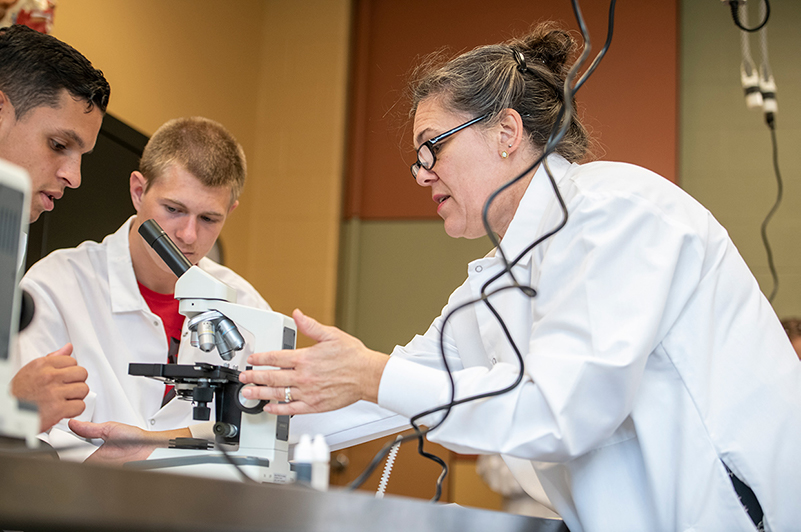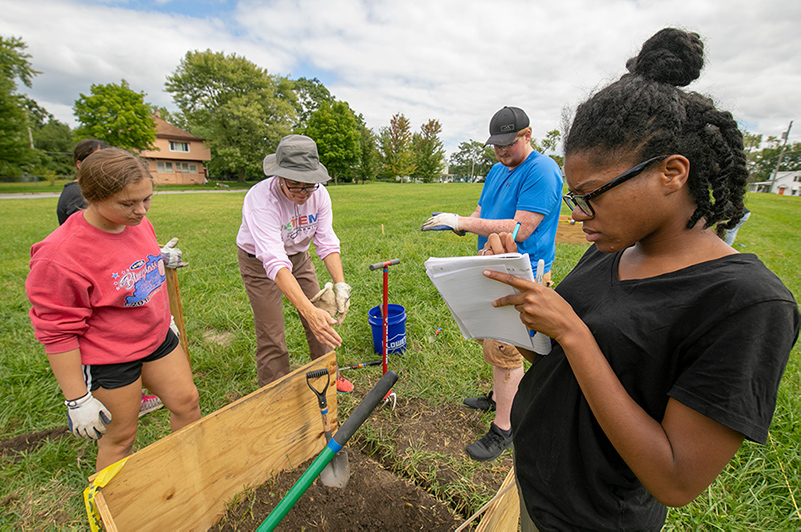When Dr. Julie Davis Good came to Indiana Tech during the summer of 2018 to head up its new biology degree program, she promised to create a get-your-hands-dirty type of learning experience for her students that involved using the great outdoors as her classroom. Dr. Good has made good on her promise; her hands-on approach and zeal for the material she teaches have made her a student-favorite among the university’s professors. See what makes her tick in this issue’s A Few Words With feature.

Although you have been at Indiana Tech a fairly short amount of time, you have earned a reputation for being a dynamo who promotes her program and teaches with absolute energy and gusto. Where does this zest come from?
I really don’t see myself the same way. For some reason, I see needs—in our world, in our lives, in the ways that we process information. I believe we have a responsibility to truly change the world. My small role to convey a new way to think or to make new connections is what wakes me up in the morning. I love every morning!
Many of the things you love to study—worms, bacteria, etc.—are things that turn other people off. What spurred this interest in you?
I guess in looking back, I was an outdoorsy girl growing up in rural Wells and Whitley counties, just 20 miles from Tech. Mom and Dad planted large gardens, and we tended those and harvested hundreds of canning jars worth of produce along with with peaches, currants, raspberries and gooseberries from my great-grandmother’s farm on West Hamilton Road. We also had goats (which I milked every night for several years) and I baled hay to feed them. I loved the earth from a young age. Our earth is alive only because of the sun and the “gross” things that return back to us what we discard. As I’ve gotten older, I truly appreciate the gift of the earth; I truly believe that our main job is to be caretakers of this amazing system.
Are there regions you find more exciting to do the work of a biologist—more interesting organisms to study, etc.? If so, where and why?
The ‘fun’ of science is discovery, but the road to discovery is not really ‘fun.’ Instead of getting 90% right to get an A, scientists typically get 5% or 10% ‘right.’ Tenacity plays a huge role in who finds the answer to a difficult scientific question. Excitement occurs a bit more frequently than fun occurs. Scientists regularly put each other in the hot seat to press experimental findings or to uncover the ‘missed control’ or the ‘gaping hole’ in the logic. That has happened a number of times to me, working on immune regulation genes, then coronavirus, HIV, tuberculosis, bladder cancer and finally myeloid leukemia. These are not really ‘ah-ha!’ moments, but ‘Oh shoot! How did I miss that?’ This is the value of a well-designed experiment. This is exciting! I am always amazed that we still don’t know what we don’t know. But we must press on to find those ‘unknown unknowns’ that will bring health and equity to our grandchildren.
Do you have a favorite story about being out in the field, either as a researcher, a teacher, a student or a biologist?
I love being at Tech with the students and the worms and the antibiotic producers! But looking back to the late 1990s, I finished at UPENN (Philadelphia) and I began my postdoctoral fellowship at the Centers for Disease Control and Prevention (CDC, Atlanta) in the Division of AIDS, STDs and Tuberculosis. The work in the Pathogenesis Laboratory at that time focused on finding the mechanisms by which these two diseases (HIV and TB) co-opted the body into supporting the co-infection. While it was difficult work, I still remember the paper clothes, full respiratory protection (PAPR: powered air-purifying respirator) and autoclaving our shoes. It was my favorite scientific endeavor because we were doing critical work; my colleagues were great. Truly we bonded together as a team, and we sought the best answers to try to combat these diseases despite the uncomfortable hours in biosafety Level 3 work. Even now, when we get together, we tell of the ‘horrors’ of BSL-3. Crazy.
How did you develop a love for higher education?
After the CDC, I took my first position at the University of Virginia (Charlottesville, Virginia) in the School of Medicine’s Department of Microbiology. I never wanted to leave research, but I had three children who needed to eat! While my position was to administer medical microbiology and teach 2nd-year medical students, I became more involved on campus than I had anticipated. Working at UVA provided an incredible view of the immense responsibility of the academy: how faculty should treat each other, how we should challenge our students and the manner in which we should affect change when it is needed. I was elected to the faculty senate, and took an active role in studying faculty recruitment, retention and welfare. That experience molded my views regarding the importance of an intelligent, informed and innovative faculty. Despite the provincial ideology of UVA, the faculty continue even now to demonstrate this growth mindset when social or political issues rear. I will always be grateful for that amazing inaugural academic position.
If you were not a teacher, what would you like to be doing in your field and why?
Research. I love it. Research is the manner in which we discover and understand the universe. While my life has centered on biomedical topics, I was thrilled to envision the molecular environmental side of the new biology major. Given the needs of the earth and development of land, I am excited for the new program to take off in a molecular direction and for our students to participate in responsible science.

What are some personal things you would like to share about yourself? Husband? Children? Pets?
The reason I wanted to return to Fort Wayne after decades away was because I married my 9th-grade boyfriend, Darrin Good. We met in 6th grade band and—while he was a city-boy from Columbia City which was completely different from the farmland—I invited him to Sadie Hawkins in 1980. We married 37 years after our first date. Between us we have six children, a chocolate Labrador and a very fluffy orange tabby cat. It’s wonderful to be back home again.
When Dr. Good gets some downtime, what could one expect to see her doing?
When no one is around, I pick up sheet music from either the baroque period or 1970s rock era to play piano and sing. When people are around, I enjoy hosting lively parties for 25-plus family members and friends. To recuperate after that, I love being a passenger on long motorcycle trips.
Anything else you would like to share with the world?
The past six months have shown us how fragile our world truly is. I believe that we must put more thought and effort into caring for each other and into making even our small realm more just and compassionate. ‘Ubi caritas.’
